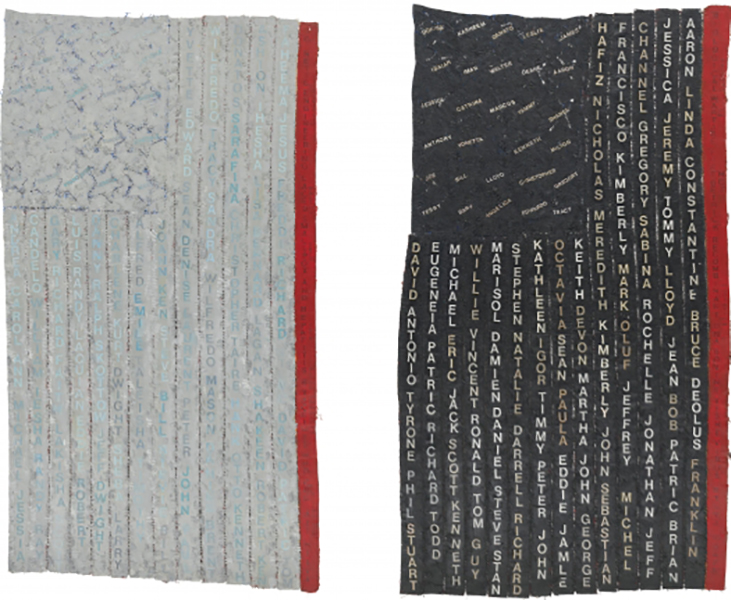
Separate But Equal Genocide: AIDS, 1991-92, mixed media on canvas, 75 1/2 x 91 inches. Courtesy of the artist and Garth Greenan Gallery, New York.
OAKLAND, CALIFORNIA—The Artists’ Legacy Foundation is pleased to announce Howardena Pindell (b. 1943) as the recipient of the 2019 Artist Award. Pindell’s multifaceted practice explores composition and color, as well as political topics including racism, feminism, and exploitation.
The Artist Award is an unrestricted merit award of $25,000 given annually to a painter or sculptor who has made significant contributions to their field and whose work shows evidence of the hand.
Pindell says, “I am very thrilled to receive the Artist Award…. I am used to being under the radar.” She cites the support of dealer Garth Greenan and the encouragement of friends, family, and colleagues who never give up.
Throughout her five-decade career, Pindell has created artworks with richly textured surfaces that explore complex and coded narratives. Her practice spans many media, including painting, works on paper, photography, film, and performance.
In 1979, after a serious auto accident, Pindell’s artwork took on an autobiographical focus. Tracing her body, she created cutouts that she incorporated into large paintings. The resulting Memory Test and Autobiography series were a way to physically put herself back together, but also to explore aspects of selfhood. She further explored ideas of identity and racial injustices in the film Free White and 21, which recounted personal experiences and influential moments of racism. Even in the progressive halls of the art community, the film was not widely exhibited. Instead, it found an audience in college campus screenings and underground film venues.
Among Pindell’s most recognized bodies of work are meticulously assembled paintings and works on paper utilizing hole-punched dots, numbered and embedded in handmade paper or laid within tight grids on canvases. In artworks from the 1980s, the dots are repositioned to stand on end, creating textural surfaces that incorporate light and shadow as formal elements. Pindell has described the work as “metaphorical processes of destruction/reconstruction”.
Pindell’s ongoing interest in circles partly stems from childhood road trips with her family, during which she noticed that their chilled root beer mugs had red circles on the bases. Her father explained that silverware, dishes, and glasses were marked with circles to indicate they were for serving non-white customers. Over the ensuing decades, Pindell came to see circles in other contexts, not just as a symbol of exclusion or separation, and her ongoing exploration of the shape shares a complex and diverse symbolism with a wider audience.
Pindell’s work reminds us that there is always more to explore through the lens of abstraction. In an artist’s statement she describes her series Separate but Equal as reflections on “universal struggles for dignity, civil and human rights, as well as some of my personal agonies.”
Pindell has contributed to the art community in myriad ways. Four decades of students at the State University of New York, Stony Brook have benefited from her teaching. As a co-founder of A.I.R. Gallery in 1972, she and 19 other artists created a New York City gallery space focused on female artists. Pindell has also been a prolific writer, whose insightful essays draw attention to intersectional topics, often using personal anecdotes to look closely at racism and feminism.
The 2019 jury panel included three artists: painter and sculptor Greg Colson, performance artist and educator T.J. Dedeaux-Norris, and painter Melissa Meyer.
“Pindell’s visual work, writing, institutional critique, and service to others are admirable and truly a lesson in authenticity and rigor for younger careered artists,” says Dedeaux-Norris. “I’m filled with unquantifiable joy knowing I played a small part in acknowledging a more than deserving artist whose work has influenced me profoundly.”
Meyer comments, “I think of her as a courageous and important artist who makes beautiful work and is contributing to the tradition of abstraction through a long and productive career.”
“As an artist, museum curator, university professor, and co-founder of A.I.R. Gallery, Howardena Pindell has been an essential force in the art world for over fifty years,” Colson asserts. “Her textured abstractions, constructed of numbered paper dots, are at once, visually captivating and a pointed reflection on racism.”
